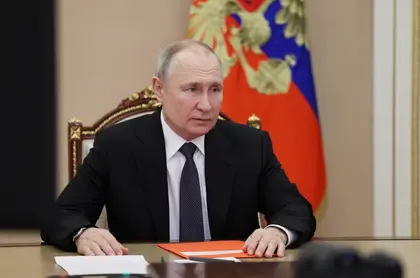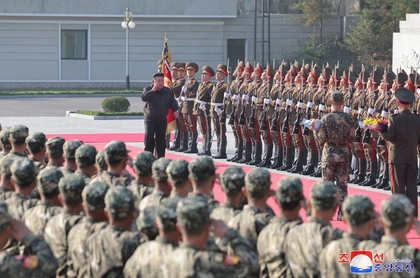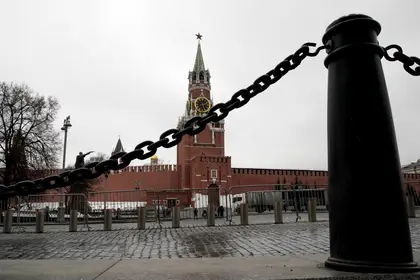In an opinion piece in Die Welt on April 17, the US journalist and political scientist Fred Kaplan expressed the view that the easiest way to end the bloody war in Ukraine was through the physical elimination of President Vladimir Putin. Many people probably share the sentiment, but is that really the best or most likely way forward?
There are now signs that the damage that has been inflicted upon Russia, by Putin’s reckless war in Ukraine, which the political elite has known for some time is becoming increasingly recognized by the Russian population at large.
JOIN US ON TELEGRAM
Follow our coverage of the war on the @Kyivpost_official.
There are anonymous reports that discussions about the country’s future, in general, and the succession plan for replacing Putin, in particular, are taking place in the backrooms of the clubs and salons of Moscow. Everyone, except perhaps Putin himself, understands that his time is fast coming to an end.
Political analysts of every stripe are starting to agree that Putin's regime is unlikely to survive the war of aggression that he started in Ukraine. There seems to be no question that, whatever the outcome of the war, there will be regime change. The only question is whether there will be a peaceful handover or not.
The most likely scenario is some form of “palace coup.” While this might be by way of assassination, it’s more likely to be that he would be persuaded to stand down in Russia’s, and his own, best interests. Even those whose privilege and influence have relied on Putin’s patronage, now understand that he has driven Russia into a black hole that will damage, not only the country but them personally.

South Korea Demands 'Immediate Withdrawal' of North Korean Troops in Russia
Their main concern, based on all that has gone before, is not what’s in the best interests of Russia, or indeed Ukraine, but themselves. They will be thinking of ways to mend bridges with the West, recover their assets and the freedom to enjoy their wealth. They have finally realized that as long as the war continues and Putin remains in power, they will never be able to do this.
However, while the decision to end the war will be Russia’s, it will be the West that will ultimately control any process of reconciliation or reversal of Russia’s current isolation. Perhaps, while still disavowing any attempt by the West to engineer regime change, we should be making it clear to both the Russian public and especially the elites, that a post-Putin Russia would be welcomed back into the European family.
That would, of course, be subject to Russia ending the war, respecting the sovereignty of its neighbors, releasing dissidents, restoring political freedoms and agreeing to reparations for Ukraine.
This also means the West rowing back on some of the rhetoric we have heard during the war, such as that of the former Finnish prime minister, Alexander Stubb, who claimed that “Russia is in the process of isolating itself from Europe for decades ... it did not have to be this way, but Putin decided otherwise.” The war in Ukraine has unleashed understandable anger toward both the Kremlin and the Russian public. Many argue that Russians are complicit through their support for Putin.
While the West has a post-victory strategy for Ukraine, including a route towards EU and NATO membership, there can be no similar vision for Russia without knowing who we will be dealing with.
Will he jump or will he be pushed?
The first question is, will Putin choose his own successor or will power be seized and a new leader imposed? In the almost quarter of a century since Putin came to power, he has gone to extraordinary lengths to sideline and remove rivals, surrounding himself with pliable supporters and rewriting the constitution to retain his rule.
History shows that occupants of the Kremlin tend to leave in a box. Although the last Russian head of state to be assassinated was Czar Alexander II - Lenin, Stalin, Brezhnev and his two successors all died of natural causes. There are precedents for leaders being forced out of office: Khrushchev in 1964 and Gorbachev in 1991.
Gorbachev’s successor, Boris Yeltsin, resigned through “ill health” in December 1999, naming Putin as his successor, thereby avoiding the struggle among Kremlin insiders that traditionally followed the departure of the leader.
With presidential elections slated for 2024, it would be an ideal opportunity for a peaceful, managed succession. If Putin were to indicate that he would not run, whether voluntarily or otherwise, that would make life so much easier for everyone – especially if he nominated a successor who had wide acceptance both in Russia and outside. Sadly, his actions both historically and recently indicate that he is unlikely to relinquish power freely.
Most observers agree that if Putin goes, the new leadership would quickly bring an end to the war. “The center of gravity of the elite is against the war. They have never liked it,” argues Nigel Gould-Davies, a former British ambassador to Belarus.
Who are the likely runners and riders?
Politico, a German-owned, US-based news outlet identified 12 possible successors to Putin and assessed both the likelihood of them taking over and how open they would be to ending the war and mending bridges with the West.
Politico considers that barring Putin nominating a successor, the most likely scenario for Putin’s immediate replacement would be a “troika” of representatives from what it terms the “power ministries” of the Security Council, the FSB, the Interior Ministry and the Defense Ministry.
Failing that it identifies three individuals whom it considers the most likely heirs: Nikolai Patrushev, a former head of the FSB and now secretary of the Security Council of Russia; Dmitry Medvedev - former president and prime minister who is now deputy chairman of the Security Council and once considered as Putin’s protégé; Alexei Dyumin, the high-profile veteran of the Federal Guard Service and the special forces commander of the “little green men” during the 2014 annexation of Crimea.
Other “possibles” mentioned by Politico, but effectively dismissed as only “probables” include Mikhail Mishustin, the current Prime Minister; Moscow Mayor Sergei Sobyanin; Chechen strongman Ramzan Kadyrov; Yevgeny Prigozhin, Putin’s “chef” and head of the Wagner mercenary army.
Interestingly they judge that both Defense Minister, Sergei Shoigu and Chief of the General Staff, Valery Gerasimov, who would have both been candidates before the war, have lost all credibility as leaders because of the way the war has gone.
Similarly, the chances of a “color revolution” led by critics of the Putin regime such as Alexei Navalny or Mikhail Khodorkovsky are considered unlikely although their “rehabilitation” would make sense as a gesture of reconciliation toward the West by whoever takes power.
What about a popular revolution?
A repeat of 1917 is considered most unlikely. In spite of the military failures in Ukraine and the punishing sanctions imposed on Russia, most citizens have just got on with their lives as though nothing is happening. There were early protests against the war but these have not escalated into the widespread civil unrest that they at one time seemed likely to become.
That might, of course, change if the war lingers on or if there were further dramatic losses on the battlefield, accompanied by substantial losses of territory occupied by Russia since 2014, and masses of wounded and unhappy troops returned home.
Regime change in Russia seems ever more likely but will be decided ultimately in Moscow. Western policymakers should now be preparing for that eventuality and creating the conditions and incentives for more democratic-minded forces to prevail.
Putin is not immortal – and his political frailty is becoming more evident by the day.
You can also highlight the text and press Ctrl + Enter






